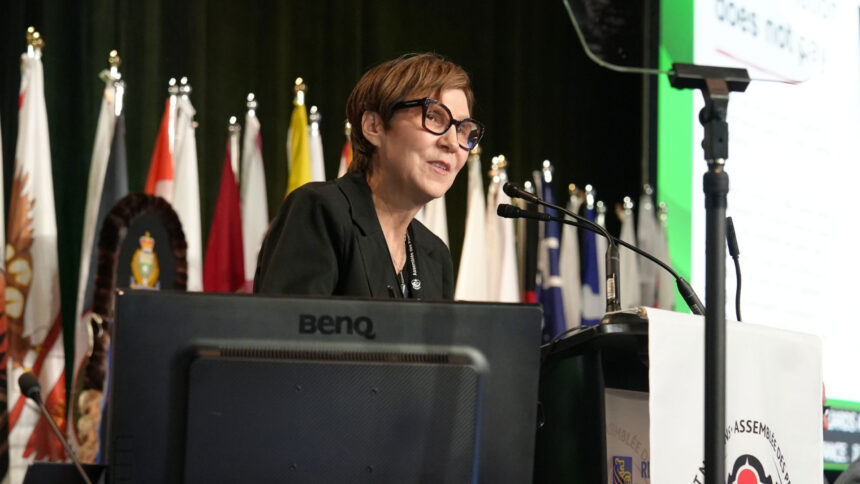Chiefs at the Assembly of First Nations annual gathering in Winnipeg voted to give the National Children’s Chiefs’ Commission (NCCC) $1 million to help it negotiate reforms to the First Nations child welfare system with Ottawa. The original resolution was intended to accept the NCCC’s terms of reference and give it a mandate to negotiate long-term reform. After hearing Blackstock’s plea for funding, chiefs amended the resolution to add the injection of cash. The resolution titled Approving Terms of Reference for FNCFS and Jordan’s Principle Tables was amended to compel the AFN to “allocate or re-allocate 1,000,000 from AFN’s budget in accordance with AFN’s finance policy to support the NCC to fulfil its mandate.” The resolution passed 106 to 28. Earlier in the AFN gathering, Cindy Blackstock, executive director of the First Nations Child and Family Caring Society, told chiefs that the NCCC was working with very little since it formed in December 2024. “They’re set up and ready to go with zero dollars,” Blackstock told the gathering. “If Canada doesn’t come across with the money, I’m hoping all of us can because that’s exactly what happened for the Caring Society when we were getting down to our last few pennies and we didn’t have anything really to rub together.” Even with the injection of cash, there’s a shortfall. It’s estimated the NCCC will need closer to $8 million to complete its work. Typically, Ottawa has funded both sides of negotiations in similar circumstances, but not always. Blackstock told chiefs that back in 2007, when the Caring Society first launched a case to prove Canada was discriminating against First Nation children in the child welfare system—by underfunding the system and services compared to other children in the provincial system—Canada retaliated. “Canada cut all the Caring Society’s funding within 30 days. We had $50,000 in the bank and we were going against the biggest law firm in the country [Justice Canada]. We didn’t know if we’d be able to finish it off but we had Elders and advisors on our board who said, ‘do it anyway,’” she recalled. “My message is ‘I hope Canada does do the honorable thing and provides the funding support the National Children’s Chiefs Commission requires,’” she said, but joked that she hasn’t ruled out holding bake sales to fund negotiations. Chief Pauline Frost, chair of the NCCC at the AFN assembly on Thursday. Photo: Mark Blackburn/APTN. Chiefs passed two resolutions—60 and 61—in December 2024 to mandate the creation of a new commission, the NCCC, to negotiate on their behalf to work out a deal to reform the on-reserve child welfare system. The Canadian Human Rights Tribunal (the Tribunal) determined Canada discriminated against First Nations children in a landmark ruling almost a decade ago. Since then, Canada has been negotiating a deal to address discrimination in the system. The NCCC was formed after a majority of chiefs voted down a previous $47.8 billion agreement on child welfare reform in 2024. That deal “did not meet all of the needs that you’ve identified as essential for your children, for our children,” said Frost, who chairs the NCCC. Since then, Canada negotiated a separate $8.5 billion agreement on child welfare reform with chiefs in Ontario but the Tribunal ruled that Ottawa must also negotiate with the NCCC. The 11-member commission has since built a negotiating team, established protocols, and attempted to bring the federal government to the table. But Canada has “refused to come back to the table to negotiate an agreement on national children’s service reform,” said Frost. Then, in a ruling dated Aug. 20, the Tribunal ordered Canada to negotiate with the NCCC, the AFN, and the Caring Society—or face the possibility of an “imposed final solution.” The Tribunal gave Canada until Aug. 29 to decide whether it will resume negotiations. The federal government responded to the Tribunal with several questions and objections that have not been addressed. Canada has been urging the Tribunal to approve the deal it reached with the Chiefs of Ontario and Nishnawbe Aski Nation in February. The federal government believes that the deal could inform negotiations on a national level. However, the Tribunal disagreed and in its ruling directs the feds to proceed on both the Ontario agreement and national long-term reform. Referencing the Human Rights Tribunal’s recent ruling, Frost said, “It’s a game changer for us.” The Tribunal wants a comprehensive long-term reform plan on child welfare submitted within four months, by December 20, for its consideration. Continue Reading
Chiefs pass resolution for $1M in funding to commission to negotiate child welfare deal

Leave a Comment










